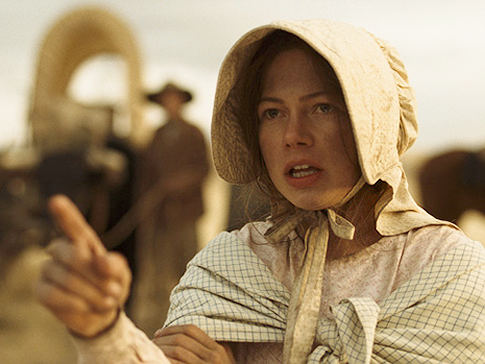“We’ve come to a terrible place,” says a member of a lost and increasingly desperate 1845 traveling party on the Oregon Trail, in Kelley Reichardt’s understated 2010 drama. A portrait of pioneers who have a date with Manifest Destiny, the film follows a blustery guide and several clans as they traverse the Northwest looking for America’s future, having been sold on stories of plenty, but instead finding a cruel earth that dispenses wealth or woe on a whim.
Gruff guide Stephen Meek (Bruce Greenwood) talks big about the gold in them thar hills, but the three families who’ve paid him to deliver them to some semblance of utopia—the Tetherows, the Whites and the Gatelys–are low on water and patience. They’ve been wandering the desert for weeks and have come no closer to their original destination. Lost in a strange land that is not yet American, the party puts up with all manners of privations as they continue on their road to nowhere. When Meek captures an Indian, Emily Tetherow (Michelle Williams) believes that they may be better off allowing the stranger (Rod Rondeaux) to lead them than their puzzled pathfinder, although there is the chance they will be delivered into an ambush. But one thing can be scarier than this choice: the realization that there truly is no choice to be made, that the forks in the road will decide their fate regardless of who is at the head of the line.
It’s easy to forget in our insta-societry that for much of our country’s history pioneering meant heading somewhere and then waiting for the future to arrive. Until civilization took root, settlers were prone to the conditions and dependent on luck as well as grit. But the pioneer spirit has come to mean something different to us–not waiting for the future to arrive, but trying to keep up with one that arrives with stunning regularity. That’s where we are now, pioneers all, willing or not.•

